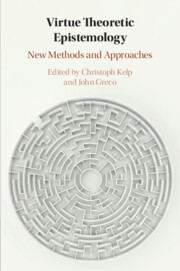Book contents
- Virtue Theoretic Epistemology
- Virtue Theoretic Epistemology
- Copyright page
- Contents
- Figures
- Contributors
- Acknowledgements
- Introduction
- Chapter 1 Closed-Mindedness As an Intellectual Vice
- Chapter 2 Epistemic Virtues and Virtues with Epistemic Content
- Chapter 3 Difficulty and Knowledge
- Chapter 4 What Is Epistemic Entitlement?
- Chapter 5 Knowledge-Producing Abilities
- Chapter 6 Virtue Epistemology, Two Kinds of Internalism, and the Intelligibility Problem
- Chapter 7 Knowledge Is Extrinsically Apt Belief
- Chapter 8 Explaining Knowledge
- Chapter 9 Anti-risk Virtue Epistemology
- Chapter 10 Responsibilism within Reason
- Index
- References
Introduction
Virtue Theoretic Epistemology
Published online by Cambridge University Press: 16 July 2020
- Virtue Theoretic Epistemology
- Virtue Theoretic Epistemology
- Copyright page
- Contents
- Figures
- Contributors
- Acknowledgements
- Introduction
- Chapter 1 Closed-Mindedness As an Intellectual Vice
- Chapter 2 Epistemic Virtues and Virtues with Epistemic Content
- Chapter 3 Difficulty and Knowledge
- Chapter 4 What Is Epistemic Entitlement?
- Chapter 5 Knowledge-Producing Abilities
- Chapter 6 Virtue Epistemology, Two Kinds of Internalism, and the Intelligibility Problem
- Chapter 7 Knowledge Is Extrinsically Apt Belief
- Chapter 8 Explaining Knowledge
- Chapter 9 Anti-risk Virtue Epistemology
- Chapter 10 Responsibilism within Reason
- Index
- References
Summary
There are three leading theories of normativity: teleology, deontology and virtue theory. All three types of normative theory countenance values, norms and virtues. What they disagree on is the order of explanation. Teleology takes values to be the fundamental normative kind and explains norms and virtues in terms of them. Deontology takes norms to be the fundamental normative kind and explains values and virtues in terms of them. And, finally, virtue theory takes virtues to be the fundamental normative kind and explains norms and values in terms of them.
- Type
- Chapter
- Information
- Virtue Theoretic EpistemologyNew Methods and Approaches, pp. 1 - 14Publisher: Cambridge University PressPrint publication year: 2020

